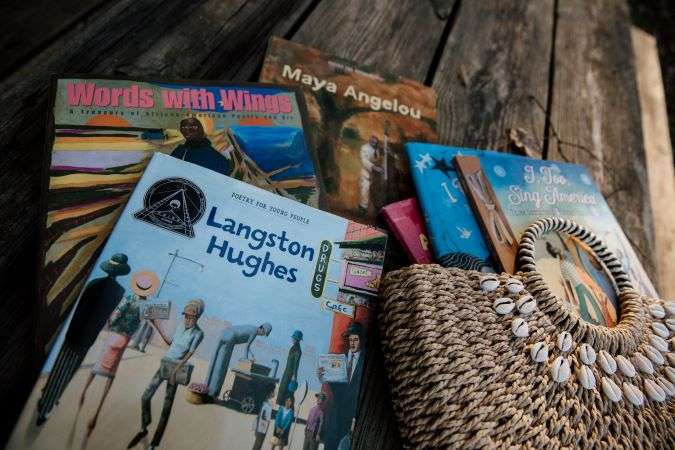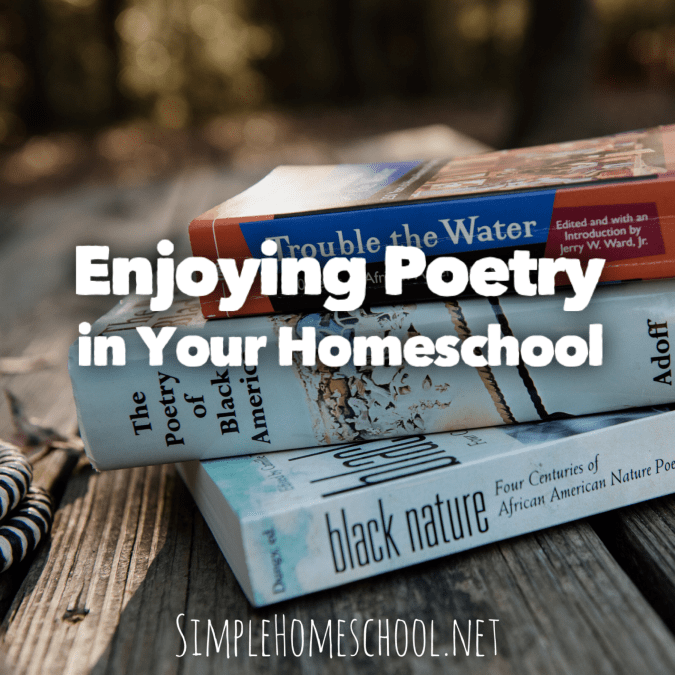8 Easy Ways to Enjoy Poetry in Your Homeschool
8 Easy Ways to Enjoy Poetry in Your Homeschool ~
Written by Amber O’ Neal Johnston of Heritage Mom
In winter I get up at night
And dress by yellow candlelight.
In summer, quite the other way,
I have to go to bed by day.
This stanza from “Bed in Summer” by Robert Louis Stevenson was the initial verse of poetry I read to my children on our first official day of formal lessons over eight years ago. Because I’d never developed a love of poetry, I shared this simple but enjoyable poem with apprehension.
I wanted to give my children opportunities to build relationships with poets and their words, enjoying poetry in our homeschool, but I wasn’t sure what to do beyond just reading random poems.
As it turns out, this lack of experience and direction worked in my favor. I purchased an anthology of children’s poetry that I saw recommended online, and we started reading 1-2 poems a day with no agenda other than pure enjoyment. We didn’t dissect the verses, search for deep symbolism, or focus on scansion.
I didn’t even know what scansion was! Each morning over breakfast, we would read a little bit of poetry aloud, smile, and move on with our day. It was easy and felt perfect.
That’s not to say that a poem should never be studied; there is undoubtedly room for engaging deeply with verse. The poet Monk Gibbon explained that the first step is to see children enjoy poetry, after which they’ll often move on to the next stage on their own.
Namely, they’ll seek “to study those poets whose work needs some preliminary elucidation if it is to be appreciated.”
The difference, it seems, is one of desire. Rather than force children to pick apart poetry, we can help them to enjoy it so they will want to study to appreciate better what they encounter.

If you’d like to incorporate and enjoy poetry in your homeschool routine, here are a few easy ways to help make it enjoyable:
1. Memorize a poem
I encourage my children to learn by heart the verses they love. My grandparents used to recite poetry from their childhood on a whim, and I was always impressed. It’s a sweet way of bringing a smile to someone’s face at any moment.
2. Make things fancy
We often pair poetry with tea and yummy baked goods – sometimes homemade, sometimes store-bought. I’ll light a candle, set out our tea service, and serve the treats on a pretty platter. The poetry is the same, but the ambiance makes it feel more special.
3. Take it outside
We love reading poetry outdoors and especially with friends. Sometimes we’ll invite other families to join us at the park or by the creek to recite poetry for one another.
Usually, it’s a no-frills type of thing, but every April (National Poetry Month), we go all in as we host an annual program for our homeschool group.
4. Lean into your background
Poetry is a beautiful way to connect more deeply with your own culture.
My family has engaged with many Black poets who especially speak to us, including Effie Lee Newsome, Langston Hughes, Claude McKay, Paul Laurence Dunbar, Maya Angelou, Alice Walker, and Gwendolyn Brooks. We even named our little boy Brooks after the latter.
5. Engage with different cultures
Discovering a love for the imagery and ideas of others is one of the best gifts of poetry.
My family has gained a deeper understanding of the joys and disappointments of many people groups by reading work from an array of international poets and American poets of Chinese, Korean, Cuban, Palestinian, Guatemalan, Filipino, and Native ancestry.
6. Attend a reading
Poetry comes alive when read aloud, and hearing expressive and vibrant readings is an incredible way to enjoy it. In our area, public readings can be easily found on college campuses, coffee houses, and bookstores.
7. Use poetry for gifts.
Poetry can be very personal. People tend to be attracted to certain types or qualities, so receiving or giving a particular poem that someone shares just for you is a lovely and unique experience.
When you encounter a poem you can’t stop thinking about, be sure to share it with a loved one.
8. Write your own.
Poetry has a way of infecting us with urges to hear more and even write our own. Encourage your children to try their hands at penning a verse and take it a step further by joining them in the endeavor. It’s fun to share your silly or serious thoughts with others.
Poetry can be intimidating if you believe that there’s only one right way to pursue it.
Once you embrace the freedom to read, smile, and move on, you’ll find that there are abundant opportunities to grow your love of verse in every direction. You will find the joy of having poetry in your homeschool day.
What’s Your Child’s Learning Style? Take Jamie’s new quiz and set yourself up for homeschooling success by understanding the way they learn best!



One Comment
Comments are closed.